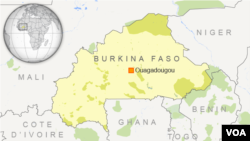Yacouba Sawadogo, a farmer who turned an area of semi-desert into a forest in Burkina Faso, fears he will lose the land of his ancestors to developers who will tear down the trees he has nurtured for some 40 years.
He devised a technique which is now used across Africa's Sahel region to help stop the spread of desertification, restore fertility to the soil and enable people to grow more food.
Sawadogo has traveled widely sharing his technique called Zai, helping people to grow food and make money from dry land.
But the ancestral plot on which he developed his technique is under threat. Investors building a housing project have annexed parts of his land, and carved it up into smaller plots, he said. One plot contains the well he built ten years ago, and another the graves where he buried his parents.
"The new owners will destroy those graves because that is not part of their tradition," he said.
Sawadogo began to plant his forest in the 1970s at a time when people were fleeing famine and drought in the countryside.
Efforts to stop the country's desert areas from expanding had failed, and people were no longer able to feed their families.
He experimented with different techniques, and eventually found one that worked. He dug holes in the soil and filled them with manure and compost. These attracted termites which built tunnels in the hard ground, helping retain the rains.
Sawadogo's community thought him mad but he persisted, and today he has a forest covering 25 hectares (62 acres).
He planted trees with medicinal properties because at the time there were no health clinics in the area. Locals still use the trees to treat illnesses, he said.
"What I love most is the land, the soil. If we take good care of our earth we can obtain anything from it," Sawadogo said, speaking through an interpreter at the Sept. 22-26 Slow Food festival in the Italy's northern city of Turin.
The festival brings together campaigners, farmers and academics seeking ways to improve the quality of food and the lives of those who produce it.
"Everything starts from the land," Sawadogo said, adding that chemicals often destroy the soil and should not be used, in his opinion.
"What we need is mobilization to ensure this vision will allow us to preserve our planet ... We must all be engaged because it is not one person alone who can stand up to this challenge, but together we can."
He hopes he will be able to keep his forest for future generations, adding that the poor need more rigorous laws to protect their land.
"All I hope for today is to be able to protect my forest ... My idea is my work will give knowledge to people, feed people and allow them to keep good health," he said.









